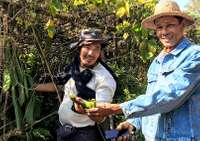ECHOcommunity成员聚光:Tuntun与Thaung Si先生 2020-04-08

Patrick Trail报告摘录 – ECHO亚洲
我与Tuntun先生走在缅甸乡下的农场,当他自豪地向我展示他所制作并用于果树苗盆栽混合土的生物炭时,我情不自禁地笑了。他现在不再燃烧农场的有机废物,而是将其变为可用于生产更多农作物的宝贵资源,而非通过烟雾将碳排放到大气中。
大约一年前,Tuntun先生在PyinOo参加了一个种子保存讲习班,在其中一个实践操作课上学习如何制作生物炭。他马上回家自己尝试,而且非常成功。Tuntun先生现在甚至主持了一个Facebook专页,与其他讲缅甸语的农民分享耕作技术,讲解生物炭等实践技术!

Thaung Si(左)和Tuntun(右)在炫耀刀豆种子,它们源自ECHO亚洲种子库,现在栽培以供应缅甸种子库。
这里发生的这么多事情都源自于我们在这个地区的主要合作伙伴,Thaung Si先生。作为ECHO亚洲长期的朋友及合作伙伴,Thaung Si在多个场合与我们一起参与培训活动,我们也向他学到了很多东西。三年前,他在傈僳族浸信会神学院创建了一个社区种子库。通过种子库,他教授学生农业和园艺实践,播种许多不同类型的种子,从而对许多人的生活产生了重大影响。正是在这里,Tuntun先生和近一百位当地其他农民及参与人员在去年接受了生物炭及其它技术培训,而Thaung Si则定期予以跟进。
ECHO社区在整个地区及世界各地都有许多像Thaunag Si 这样尽职尽责的合作伙伴。这些合作伙伴接受充分培训后,便能对更多人进行培训!